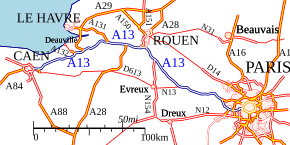A13 autoroute facts for kids
Quick facts for kids
A13 autoroute |
|
|---|---|
 |
|
| Route information | |
| Part of |
|
| Length | 225 km (140 mi) |
| Existed | 1946–present |
| Major junctions | |
| East end | Périphérique, Paris |
| West end | Périphérique Caen |
| Location | |
| Major cities: | Mantes-la-Jolie, Rouen, Pont-l'Évêque, Caen |
| Highway system | |
| Autoroutes of France | |
The A13 is a very important autoroute (which is like a big highway or motorway) in France. It stretches all the way from Paris, the capital city, to Caen, a city closer to the coast. Along its path, it also passes by other major cities like Rouen and Le Harve.
This autoroute is special because it's the oldest one in France, first opening way back in 1946! It's super popular, especially with people heading out on holiday to the northern coast of France. The A13 is about 225 kilometers (around 140 miles) long.
Contents
What is the A13 Autoroute?
The A13 is a "controlled-access highway." This means it's designed for fast travel with no traffic lights or cross-streets. Cars can get on and off using special ramps called exits or junctions. It's built for smooth and safe journeys, connecting big cities and helping people travel across the country.
Connecting Major Cities
The A13 plays a key role in connecting some of France's most important cities. It starts near Paris, making it easy for people to leave or enter the capital. It then goes through Mantes-la-Jolie and Rouen, which is a big port city. Finally, it reaches Caen, a historic city in Normandy. This route is vital for both everyday travel and for tourists exploring different parts of France.
How the A13 Helps Travelers
Because the A13 links Paris to the coast, it's a favorite route for families going on summer holidays. It helps them reach popular beach towns and historical sites in Normandy quickly. It also helps businesses move goods between these cities, making it important for the economy too.
Important Connections and Exits
The A13 connects to many other roads and highways along its route. These connections, called junctions or interchanges, allow drivers to switch to other major roads like the A12 autoroute, A14 autoroute, and A28 autoroute. There are also many exits that lead to smaller towns and cities along the way. Some parts of the A13 have tolls, meaning drivers need to pay a fee to use those sections. There are also service areas where drivers can stop for gas, food, or a rest.
Images for kids
-
The A13 Westbound just before the Giberville service station







